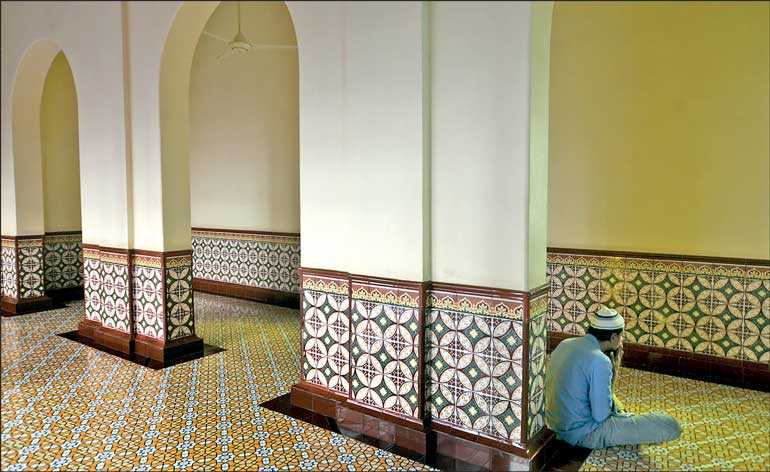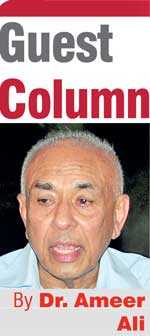Wednesday Feb 18, 2026
Wednesday Feb 18, 2026
Thursday, 28 February 2019 00:00 - - {{hitsCtrl.values.hits}}

Muslim politics and politicians in post-independent Sri Lanka have been preoccupied with only one objective, and that is, to maximise benefits accrued to the community from governments in power. 
Unlike the Sinhalese majority, and within them the Buddhists, who assert that this country belongs only to them and that other communities are allowed to live here only at the behest of Sinhalese Buddhists (a self-destructive assertion that permits other communities to remain unpatriotic); and unlike the Tamils who contest that claim and even fought and lost militarily a decade ago to get a share of the land, Muslims, because of their numerical weakness and ubiquity are not in a position either to contest the Sinhalese-Buddhist claim or to side with the Tamils.
Muslim leaders realised from the beginning that democracy in Sri Lanka is a caste and ethnic ridden power game, played between the upper and lower castes on the one hand and ethnic Sinhalese and Tamils on the other.
Therefore, the only option available to a caste-free and multi-ethnic Muslim minority, according to them, is to join the game and maximise the odds in favour. This business-like approach to local politics was fed by another factor, which emanated from the way Islam was preached to this community.
Although Islam came to Sri Lanka originally from the Middle East, in later periods, especially when the Indian Ocean trade fell into the hands of Europeans, the direction of Islamic influence and preaching switched to the
Indian subcontinent, and that too to South India.
South Indian madrasas like Baqiyat-us-Salihat in Vellore, South Indian ulema like the famous Muhammad ibn Ahmed Lebbe, popularly known as Mapillai Lebbe Alim, from Keelakkarai and South Indian madrasa-trained businessmen played crucial role in spreading Islam in this country. This is an unwritten chapter yet to be researched by local scholars.
Like Muslims of Sri Lanka their brethren in South India also are a minority and mostly a business community. This similarity, in addition to the common denominator, Shaffimadhhab or Shaffi School of Islamic thought, to which majority of Muslims at both ends belong, also meant congruence in religious beliefs, practices and vision. The essence of the religious preaching and vision injected from South India and was indigenised in course of time can be summarised as follows:
“The duty of a Muslim is to obey (the actual Tamil term used for the Arabic word taqwa was fear) the Creator (Allah) and follow the teachings of His messenger, Prophet Muhammad. A Muslim’s permanent abode is in the Hereafter, and this world is a distraction and transient. Death is certain. A good Muslim should therefore do what is obligatory in Islam, earn his/her living in the halal (religiously permitted) manner and avoid unnecessary involvement in worldly matters. Muslims are a minority living in a non-Muslim country and we do not care who rules this country. As long as the rulers allow us to practice our religion without hindrance we should be faithful to them, get what we can from them and prepare ourselves to meet our Creator on the Day of Judgement.”
Even today these sentiments can be heard expressed in mosques and other venues where local imams and preachers sermonise. In short, this otherworldly outlook and business-like attitude towards political involvement set the parameters of Muslim politics in Sri Lanka.
The destination of the Muslim political journey is, therefore, to maximise the benefits accruing to the community, and to reach that destination Muslim leaders followed three different routes, each represented exemplarily by three different personalities in three different eras.
Razik era (1947-1960)
Sir Razik Fareed (1893-1984), the “grand old man” of Muslim community and “uncrowned king of the Moors of Ceylon”, as described by a former Minister and Prime Minister, W. Dahanayake, personified in many ways the general thinking and outlook of Sri Lankan Muslims as captured in the summary above.
In Razik’s opinion, Muslims were too small a minority to play any decisive role in the nation’s political affairs, and the best they could do to promote their interests was to cooperate with rather than confront the Sinhalese majority.
This view, in actual fact, was the result of the bitter experience Muslims endured during the 1915 riots when they violently clashed with and suffered at the hands of Sinhalese. Since then Muslim attitude to politics was dictated by the search for peaceful coexistence with the majority community. Razik’s parliamentary career portrays this thinking.
For example, in 1946, he was elected as the joint-treasurer of the UNP and in the following year he contested unsuccessfully the Pottuvil seat of Parliament in the Eastern Province on UNP ticket. In November that year he was appointed as a UNP senator. In 1952, he resigned as senator and from the UNP to contest the Colombo Central seat as independent candidate. He won and in 1954 re-joined UNP.
In 1956, he was re-elected to the same seat as UNP candidate and two years later he resigned again from that party to vote with the SLFP Government of Dahanayake to save that government from a vote of No Confidence from the opposition. In the 1960 General Elections, he unsuccessfully contested Colombo Central but this time as a candidate from the Lanka Prajatantravadi Party (LPP) of Dahanayake.
Finally, in 1965 he resigned from SLFP, re-joined UNP and contested Colombo Central. Though he lost the contest yet became an appointed MP under the terms of the constitution. Razik’s frequent political summersaults once constrained then Deputy Speaker Shirley Corea to remark, “governments may come and governments may go but Sir Razik Fareed goes on for ever.” But Razik was only searching “for new and more effective means of falling in line with current policies of government in power”. In his view any government is his government. Razik’s party hopping was typical of several other Muslim politicians during this era. In the Tamil areas too Muslims contested parliamentary seats under the banner of the Federal Party, but once got elected resigned and joined the government in power. The objective of this game was always the same, to maximise the benefits to the community. The growing tension between the Tamils and Sinhalese made it easier for Muslim politicians to play this game profitably.
Badi era (1960-1977)
Badiuddin Mahmud (1904-1997), dubbed as “pioneer of a New Age,” was a product of Aligarh University in India and a teacher by profession. Popularly known as Badi, he was one of the founding fathers of SLFP and always entered the parliament through back door as appointed member from his party. He was the first Muslim Minister of Education, and “In his hands”, writes de Silva, a pro-UNO historian, “this cabinet post became at once a political base and a fountain of patronage, to be used to strengthen the ties between his community and the party to which he belonged…”
Badi rejected Razik’s contention that Muslims were too small a minority and that they could not play a decisive role in the outcome of general elections. Instead he saw the ubiquity of Muslim population as strength and not weakness. In the emerging bipolar contest between the senior UNP and junior SLFP, Badi saw the Muslim votes as bargaining chips to maximise favours. To do that he wanted the community to speak with one voice. He therefore formed his Islamic Socialist Front (ISF) not as a political party but as a pressure group.
While Muslim businessmen rallied behind UNP, the nascent Muslim intelligentsia and professionals, mostly teachers, rallied behind ISF and strengthened Badi’s position in his party. It was from that position he was able to demand and deliver a number of favours to his community from the SLFP government. No doubt, there was bitter opposition against him from Sinhalese leaders within the party, but his close relationship with the Bandaranaike family overcame all that.
Badi despised party hopping and remained loyal to his SLFP until his demise. To him lifelong commitment to one’s chosen party was the only route not only to earn respect from party leadership but also influence and power.
His route was later followed by UNP stalwarts like M. H. Muhammad and A. C. S. Hameed. After the electoral defeat of SLFP in 1977 by J.R. Jayewardene it was the lifelong commitment of these individuals to UNP and their ability to rally the entire Muslim community behind that party made one of them, Hameed, to become the first ever Muslim Foreign Minister in Sri Lanka’s history.
Ashraf era (1989-2000)
Unlike Badi who wanted Muslims to speak with one voice and bargain with national parties, M.H.M. Ashraf (1948-2000), a lawyer by profession, wished the same but with one difference. He viewed that such bargaining strategy could only work effectively if Muslims were to form a political party of their own.
In actual fact, it was his two political mentors, one a poet and the other a retired magistrate, who originally injected this idea into Ashraf’s mind. Sri Lanka Muslim Congress (SLMC) was born out of this idea and it was a unique and, as became clear later, a dangerous experiment.
Previous Muslim politicians and leaders were sensible enough to avoid forming a separate ethnic party, partly because the ethnicity of Muslims is indeterminate and a conundrum to say the least, and partly because of a realisation that Islam would be unnecessarily dragged in to the name of that party the moment Muslim is introduced into it. SLMC did exactly that. SLMC introduced Islamism into Sri Lanka.
The futility of Asharf’s route and experiment became clear when LTTE started attacking the Muslims of East and North for separating their identity from Tamil. According to LTTE’s philosophy if one spoke Tamil as one’s mother tongue then that one must be a Tamil. This argument predates LTTE and goes back to 1888, when Ponnampalam Ramanathan advanced this idea in his speech at the Legislative Council.
It was only after that controversial speech that Muslims embraced the Portuguese appellation, Moor, to identify their ethnicity. This identity therefore was born out of political necessity rather than from historical fact. After LTTE was defeated in 2009, far-right Sinhalese Buddhist groups such as Bodu Bala Sena, Hela Urumaya and Sinha Le accused SLMC for supporting the rise of Islamic fundamentalism under its banner, which led to a number of anti-Muslim riots in the Sinhalese districts. All in all, the formation of SLMC was a political blunder.
With the tragic demise of Ashraf, SLMC split into factions and today its leaders are not even prepared to contest elections under the SLMC banner. In 2015 elections for example, only one of its members contested and won on SLMC ticket while the others chose the UNP vehicle to assure victory. Ashraf era ended with Ashraf and the SLMC route turned out to be a short sighted experiment in Islamist politics.
In conclusion, Muslim politics in Sri Lanka, like that of other communities, has been an exercise in ethno-religious parochialism. None of the communities are looking at Sri Lanka as one united and unified whole, but rather an agglomeration of competing and combative ethnic groups engaging in zero-sum games.
From the Muslim side, Razik, Badi and Ashraf chose three different strategies to play this game. Ashraf’s was the most dangerous. However, when one looks at the way SLMC leaders were rushing to sacrifice principles for position and join the UNP in 2015, one feels that Razik Fareed is coaching them from his grave.
(The writer is attached to the School of Business and Governance, Murdoch University, Western Australia.)